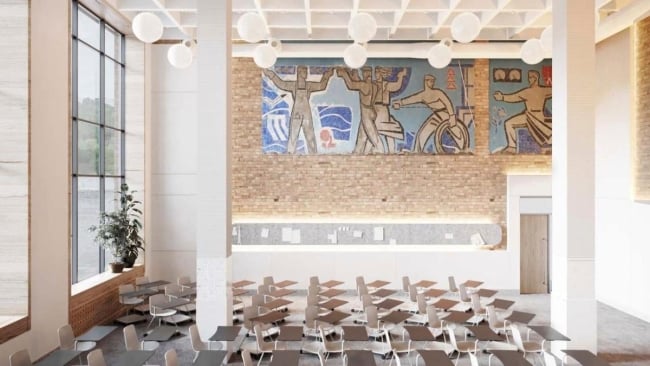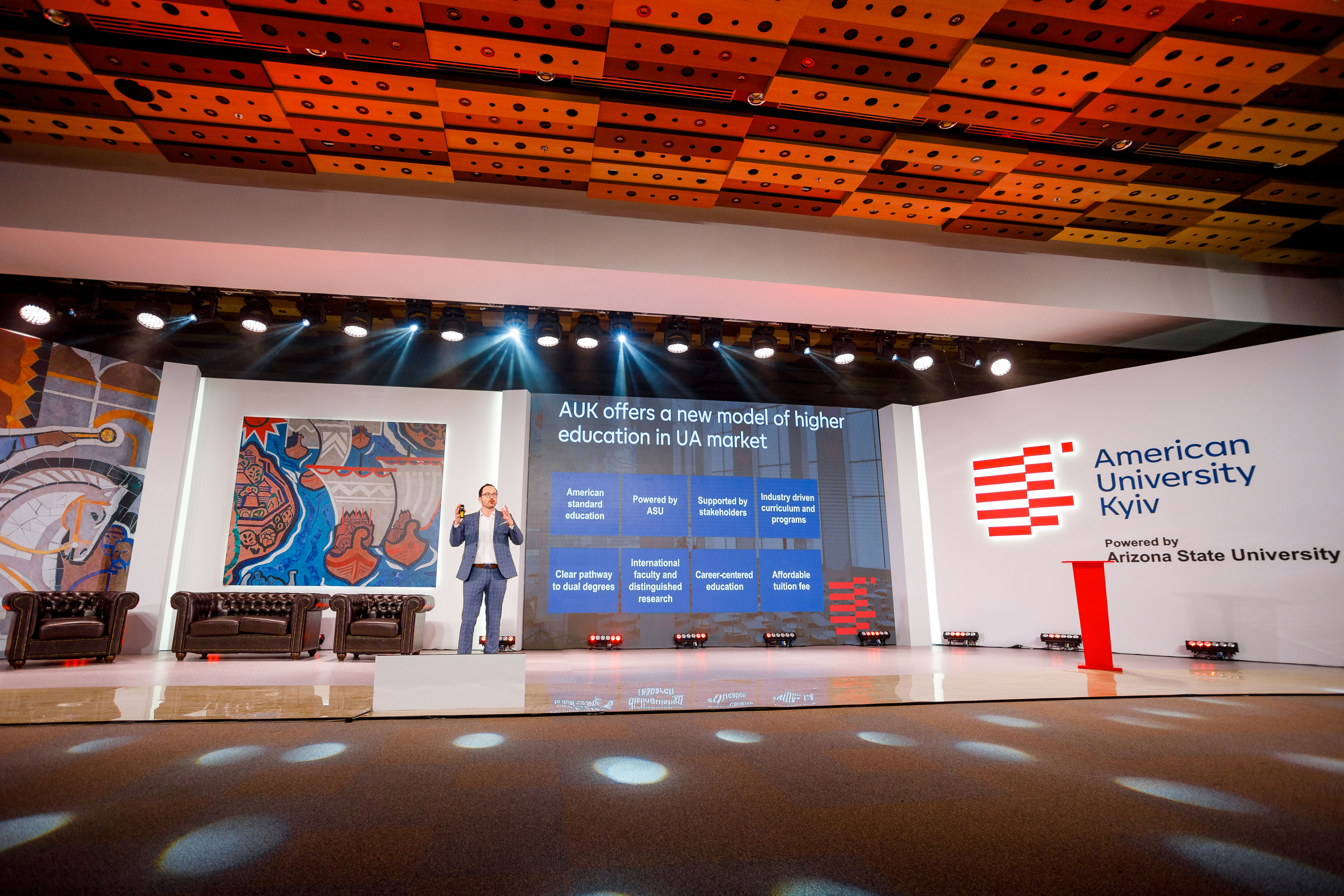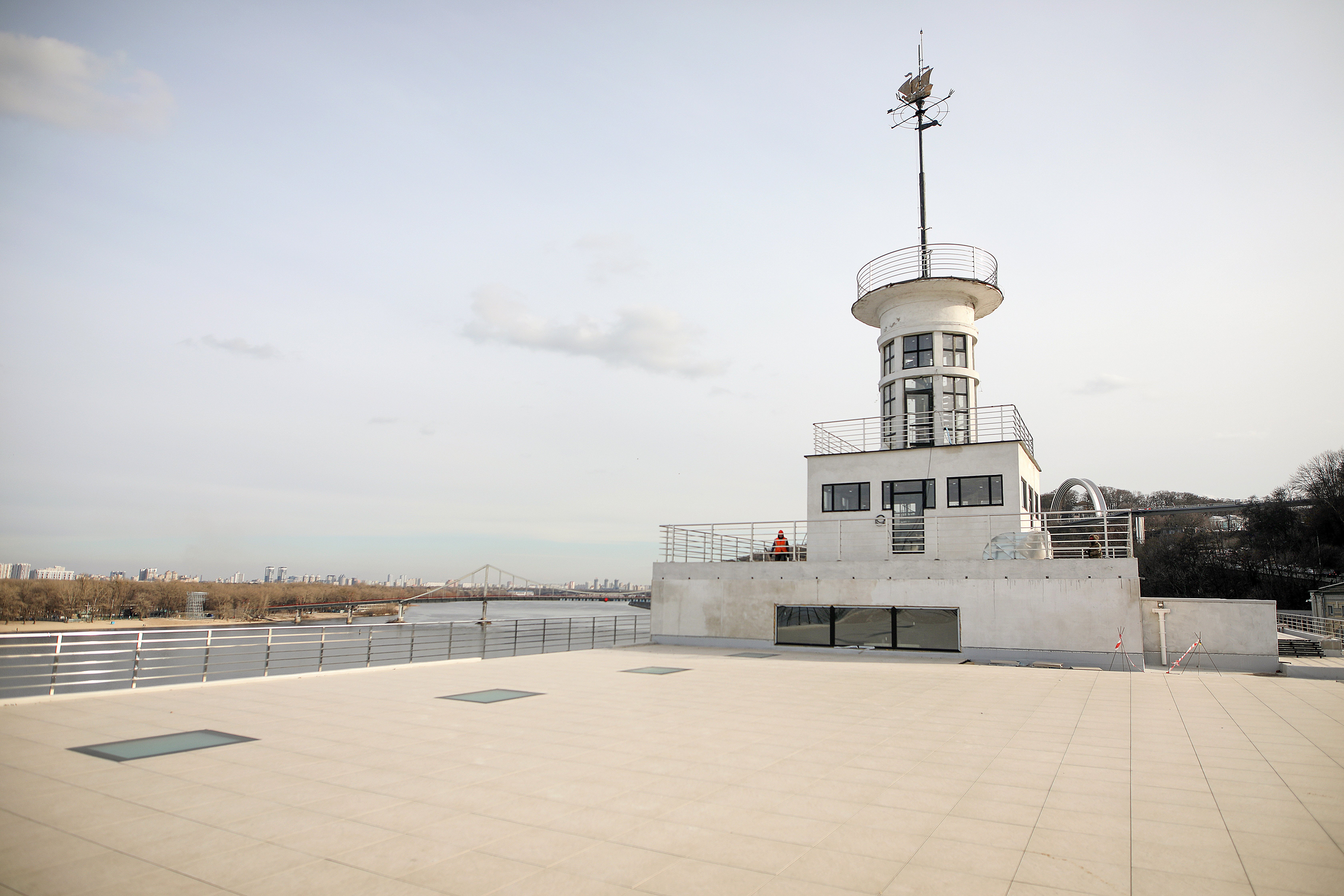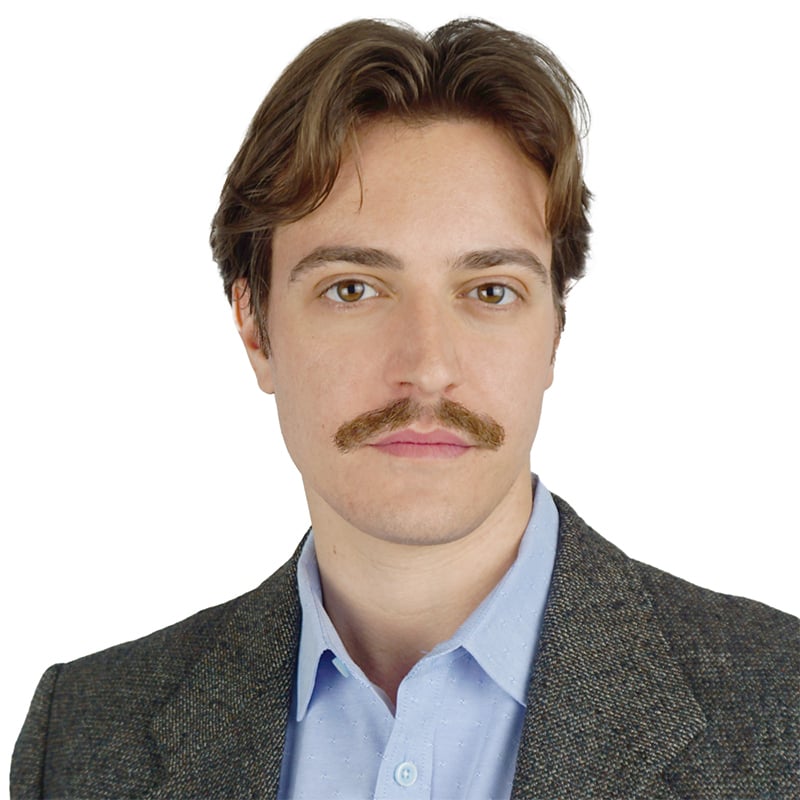You have /5 articles left.
Sign up for a free account or log in.

An empty lecture hall in the American University Kyiv building. The institution’s opening was scuttled by the Russian invasion last February, weeks before its first program was set to launch.
Courtesy of American University Kyiv
At the start of 2022, leaders and faculty attached to a brand-new American university in Ukraine were bullish about the future.
American University Kyiv, the result of a partnership with Arizona State University and Cintana Education—a private corporation and ASU partner that helps manage international campuses—would be the first institution in Ukraine developed in line with U.S. higher education accreditation standards. The university purchased classroom and office space in a historic building downtown overlooking the Dnieper River and prepared to launch a slate of graduate and undergraduate degree programs, starting with a School of Business Management. There were discussions of exchange programs with U.S. institutions. (This paragraph has been updated to clarify Cintana's relationship with ASU.)
AUK even held a launch event last February, at which dignitaries including Kyiv’s mayor and a former American ambassador to Ukraine toasted the economic and social benefits the university would bring to the country.
Three weeks later, the Russian army invaded. Kyiv’s mayor, former boxer Vitali Klitschko, and most of its male residents took up arms and trained for battle as Russian troops marched toward the capital. Many Ukrainian employees of AUK fled west to Lviv or left the country altogether. Air raid sirens sent those readying the building into a network of underground bomb shelters to wait and pray. As Russian tanks approached Kyiv, the Ukrainian Army informed university leaders that, if necessary, it would seize their building on the Dnieper as a launchpad for counterattacks.
“Everything changed pretty fast,” said Rick Shangraw, president of Cintana Education and the founding president of AUK. “We would have meetings with partners in Ukraine and sometimes in the middle they’d say, ‘Sorry, I have to go down to the bomb shelter,’ or ‘I’ve got to go help my parents; they were in a neighborhood that got bombed.’”
The war completely upended the university’s timeline. Its graduate schools, originally set to open in March, were delayed until the fall. AUK’s international faculty, some of whom had planned to move to Kyiv, remained in their home countries; Vernon Smith, a Nobel Prize–winning economist and professor at Chapman University, was scheduled to be a visiting lecturer at AUK, but the invasion prevented him from participating as he’d planned, he told Inside Higher Ed via email.
By the time the academic year started last September, the university had launched only five degree programs—two master’s and three bachelor’s. All of them have operated entirely remotely, since the campus, though not yet damaged by air raids, has been unable to open for in-person classes.
ASU, a powerhouse of online higher education long before COVID-19 made Zoom a household name, helped ease the shift to remote learning, said Roman Sheremeta, AUK’s founding rector. Still, he added, it hasn’t been ideal; AUK’s plans to expand into other buildings in Kyiv have been put on indefinite hold, and recruiting students has been challenging.
Even with the war underway, AUK hoped to hold in-person classes for the upcoming spring semester, but power shortages scuttled those plans as well.
“Russia has started to bombard that critical infrastructure, so there is literally no electricity. It has to be rationed,” Sheremeta said. “We would just be using even more of that very scarce resource, so we postponed that plan.”
The lack of electricity is also hampering remote learning. Jacob McGrew, an English lecturer at AUK’s business school, said his Ukrainian students—who make up the majority—often have trouble connecting to online classes. While his class size is supposed to be about 30 students, only five or six are usually on Zoom calls, and when there are more their connection is spotty. But the students are committed to overcoming those obstacles, he added.
“Ukrainian students are just built differently,” he said. “There’s a real commitment to mission and a passion for learning … I know these hardships aren’t going to stop them.”
A Dream Deferred
Shangraw said the initial interest in an American university in Ukraine—and the funding to back it—came mostly from three industry partners: EPAM, an American IT firm that employs almost 100,000 Ukrainians; DTEK, a Ukrainian energy and mining company; and BGV, an oil and gas company that also owns many gas stations and convenience store franchises across the country.
“The reason they wanted to fund AUK was because they weren’t getting quality employees from the existing Ukrainian higher education system,” Shangraw said. “They had to spend resources training them even after they graduated.”
 Many who signed on to work for AUK said they wanted to improve Ukrainian higher education as well and saw the American-style university as a unique opportunity to do so.
Many who signed on to work for AUK said they wanted to improve Ukrainian higher education as well and saw the American-style university as a unique opportunity to do so.
Sheremeta was born in Ukraine, and much of his family still resides there. He said he took a leave of absence from Case Western Reserve University, where he teaches economics, because he felt he could make a real difference for Ukraine at AUK—an opportunity that he felt his last job offer in the country, for the post of minister of higher education, did not provide.
“I always wanted to give back to my home country, and I finally felt I could do something great here,” Sheremeta said. “It was a real blow, because the dream was so close and then it was snatched away.”
AUK students have access to the ASU curriculum and can earn degrees from both universities. Sheremeta said the university’s adherence to American accreditation standards enhances the quality of the education, and that the English-language immersion program and integrated student information system are rare among Ukrainian institutions.
“The things that we are bringing to the market in Ukraine are not new to other developed countries in the world, but for Ukraine they’re very new,” he said.
McGrew said he’d been eager to return to the country since he taught English there as a member of the Peace Corps in 2013 and 2015.
“Everything I’ve done in my career has been to get back to Ukraine, to teach in an international school there and help this country I fell in love with,” he said. “Everyone at AUK is mission-driven and intent on making this into something great over the next few years, so it was a really exciting prospect.”
Still, he understands AUK’S cautiousness in opening for in-person learning. He said that when he moved to Ukraine in September, his family made him promise he wouldn’t settle in Kyiv anytime soon. Instead he’s living in the northwestern city of Lutsk, away from the air raid sirens and dire electricity shortages, teaching English remotely.
“I wish I was in Kyiv, teaching in person. But I also know it’s not safe right now, and I don’t know when it will be,” he said.
AUK wasn’t the only U.S. higher education partnership disrupted by the war in Ukraine. The University of Massachusetts at Amherst launched a partnership with the Kyiv School of Economics last July; the two institutions had started talks before the Russian invasion, but despite the war—and in some ways, because of it—UMass pushed forward.
“You need a robust higher education system for rebuilding and reconstruction,” said Anna Nagurney, a co-chair of the Kyiv School of Economics’ Board of Directors and a professor at the Isenberg School of Management at UMass. “That’s why professors at KSE are seeing the missiles flying and still teaching, sometimes out of bomb shelters. Because Ukrainian students are saying, ‘It’s a dark time and this is like a lighthouse to us.’”
Nagurney, whose parents fled Ukraine during World War II, said the country had been improving the quality of its higher education system, often with the help of Western institutions, before Putin’s army invaded.
“The greater investment in higher education [in Ukraine], whether at KSE or AUK, has been such a positive,” she said. “But now it’s hard to figure out how to move forward.”
Soldiering On
Sheremeta has been traveling to Kyiv intermittently for several months now, since the fighting relocated to the eastern border.
“When I visited Kyiv right after liberation, there was almost no traffic there. The city was completely empty,” he said. “Now, the city is definitely alive.”
But the signs of war are ever-present; he can see them from his office in the empty AUK building in the dark windows and shuttered businesses that line the unlit streets. More than anything, though, he hears them in the sirens.
“People live as normal a life as they can in the time of war. The real scary thing is when you hear the air raid sirens,” Sheremeta said. “Imagine sitting in your office and you’re waiting for Russian rockets and you’re looking out the window and thinking, ‘Should I seek shelter?’”

“We are rethinking our rollout to be a little bit more focused on the skill sets that Ukraine is going to need during recovery,” Shangraw said. “Project management certificates, civil engineering degrees, architectural design programs—things of that nature.”
The war has also put AUK on financially shaky ground, which will only get shakier if the fighting drags on deep into the new year, Sheremeta said. The university enrolled about 150 students across two master’s programs and three bachelor’s programs for its first semester in September, but that number hasn’t grown for the institution’s second semester.
“Prospective students are saying, ‘I don’t know what’s going to happen tomorrow. I don’t know if I’m going to have heat or a house,’” Shangraw said. “They’re asking, ‘How can I sign up for college classes at a time like this?’”
And because of the economic disruption caused by the war, students who do sign up are increasingly unable to pay the full price of admission—which, at $8,000 a year for undergraduates and $9,000 for graduate students, is higher than what most Ukrainian institutions charge.
To help compensate, AUK gave its Ukrainian students a 75 percent tuition discount for the first year. But its business model is tuition-dependent, and Sheremeta said that without more donor-funded scholarships, they’ll need to start charging the full price.
“Eventually, we need to get tuition revenue up,” he said. “Otherwise, we’re just not going to be able to sustain this.”
But Sheremeta said he and the other AUK leaders are determined not to let the university crumble under the pressures of war. Beyond its original mission of educational advancement, Sheremeta sees AUK’s eventual full opening as a manifestation of his country’s fortitude and of the international community’s ongoing support.
“It’s not just that the university can be a beacon of hope for education in Ukraine; it’s also a symbol of how Ukraine has not been abandoned in its time of need,” he said.





